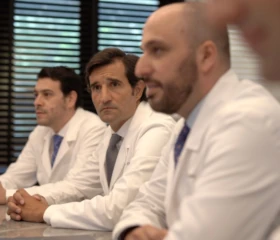Results and Quality of Life Bladder cancer
Best results in the treatment of bladder cancer.
Each year, more than 40 people with bladder cancer come to us for care.
- Super-specialized urologists
- Personalized treatment
- Minimally invasive approach
- More than 16,000 patients successfully treated
Results and Quality of Life
What we get at Roc Clinic for you:
5-year survival superficial tumor
5-year survival deep tumor
Experience and confidence
ROC Clinic's medical team has extensive experience caring for people with bladder cancer. Each year, more than 40 people with bladder cancer come to us for care.
Our professionals, also dedicated to bladder cancer research, provide individualized treatment, informing you of all the therapeutic options for your case. These include: transurethral bladder resection, chemotherapy, immunotherapy, cystectomy and radiotherapy.
Multidisciplinary teams
The formation of multidisciplinary committees, with teams made up of different specialties involved in the diagnosis and treatment of the disease, in addition to ensuring comprehensive care for each person with bladder cancer, has proven to improve patient survival. This multidisciplinary management of bladder cancer allows, from better refining the diagnosis to the optimal therapeutic approach, integrating the different treatment options such as surgery, chemotherapy and radiotherapy.
Therefore, at ROC Clinic, our patients benefit from a comprehensive consultation service for bladder cancer, always under a multidisciplinary approach that brings together the latest in research, technology and the experience of the best professionals. Our goal is that this collaborative approach allows our patients to clarify all their doubts in the consultation, to have a solid treatment plan and to have the confidence that they have at their disposal a group of specialists focused on their disease.
This medical care model has led us to be among the best Urology services in the Spanish healthcare system.
cystectomies performed per year
Your quality of life is our goal
At ROC Clinic our priority is to provide excellent medical care with the minimum interruption in the lives of our patients, so we put all our efforts in finding the safest, least complicated medical solution that allows you to quickly return to your normal life.
During the last year, our professionals performed more than 20 cystectomies, using open surgery, laparoscopic surgery and robotic surgery.
They ask us in the Consultation
Does a urine culture detect cancer?
No, a urine culture does not detect cancer, as its purpose is to identify urinary tract infections through the presence of bacteria. However, other urine tests, such as a urinalysis or urine cytology, may suggest the presence of cancer by detecting blood or abnormal cells in the urine. If there is suspicion of cancer in the urinary system, additional studies such as biomarker tests, ultrasound, CT scans or biopsies are required to confirm the diagnosis. If you detect blood in the urine with no apparent cause, it is essential to see a physician for further evaluation.
When should bleeding in the urine be studied?
When the bleeding is visible to the naked eye, it should always be studied. When it is microscopic, i.e., it is not visible to the naked eye, when it must be studied whenever it is significant (more than 3 red blood cells per field) especially in patients with risk factors: over 40 years of age or smokers or exposed to certain dye or paint substances.
What is the prognosis of bladder cancer?
In general it is good. These tumors are usually diagnosed before they infiltrate the muscle, allowing the bladder to be preserved. The problem lies in the fact that it is a chronic disease that has recurrence and relapses over time. It requires many check-ups and treatments and the patient must adhere to them without skipping check-ups, which can lead to metastasis.
When is it advisable to remove the bladder?
In general, when the tumors are muscle-invasive and have not moved, but are located in the bladder, the bladder must be removed and the urine diverted with a bag to the skin. In very selected patients and with specific characteristics of the tumor, different neobladder techniques can be used.
Team of the Bladder Cancer unit
Newsof ROC Clinic in Bladder Cancer
Research
Ureteral metastasis of a prostatic adenocarcinoma
Technology
Radical cystectomy by Da Vinci robotic surgery for maximum precision and minimum aggressiveness.
Training
Training on the controversies in non-muscle invasive bladder and upper urinary tract tumors by Dr. Felix Guerrero Ramos at the AEU.


 +34 912 627 104
+34 912 627 104 Contact
Contact










